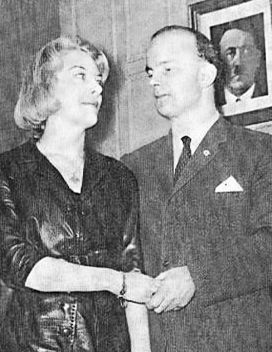Related Research Articles

John Hutchyns Tyndall was a British fascist political activist. A leading member of various small neo-Nazi groups during the late 1950s and 1960s, he was chairman of the National Front (NF) from 1972 to 1974 and again from 1975 to 1980, and then chairman of the British National Party (BNP) from 1982 to 1999. He unsuccessfully stood for election to the House of Commons and European Parliament on several occasions.
Searchlight is a British magazine, founded in 1975 by Gerry Gable, which publishes exposés about racism, antisemitism and fascism in the United Kingdom and elsewhere.
The 43 Group was a British anti-fascist group set up by Jewish ex-servicemen after the Second World War. They did this when, upon returning to London, they encountered British fascist organisations such as Jeffrey Hamm's British League of Ex-Servicemen and later Oswald Mosley's new fascist party, the Union Movement. The activities of these fascist groups included antisemitic speeches in public places, and from the rank-and-file fascists, violent attacks on London Jews and Jewish property. Group members broke up far-right meetings, infiltrated fascist groups, and attacked the fascists in street fighting.
Gerry Gable is a British political activist. He was a long-serving editor of the anti-fascist Searchlight magazine.

John Colin Campbell Jordan was a leading figure in post-war neo-Nazism in Great Britain. In the far-right circles of the 1960s, Jordan represented the most explicitly "Nazi" inclination in his open use of the styles and symbols of Nazi Germany. Through his leadership of organisations such as the National Socialist Movement and the World Union of National Socialists, Jordan advocated a pan-Aryan "Universal Nazism". Although later unaffiliated with any political party, Jordan remained an influential voice on the British far right.
Column 88 was a neo-Nazi paramilitary organisation based in the United Kingdom. It was formed in the early 1970s, and disbanded in the early 1980s. The members of Column 88 undertook military training under the supervision of a former Royal Marine Commando, and also held regular gatherings attended by neo-nazis from all over Europe. The name is code: the eighth letter of the alphabet 'HH' represents the Nazi greeting 'Heil Hitler'. Journalist Martin Walker described Column 88 as a "shadow paramilitary Nazi group".

Arnold Spencer Leese was a British fascist politician. Leese was initially prominent as a veterinary expert on camels. A virulent anti-Semite, he led his own fascist movement, the Imperial Fascist League, and was a prolific author and publisher of polemics both before and after the Second World War.

The Imperial Fascist League (IFL) was a British fascist political movement founded by Arnold Leese in 1929 after he broke away from the British Fascists. It included a blackshirted paramilitary arm called the Fascists Legion, modelled after the Italian Fascists. The group espoused antisemitism and the dominance of the 'Aryan race' in a 'Racial Fascist Corporate State', especially after Leese met Nazi Party propagandist Julius Streicher, the virulently racist publisher of Der Stürmer; the group later indirectly received funding from the Nazis. Although it had only between 150 and 500 members at maximum, its public profile was higher than its membership numbers would indicate.
Martin Guy Alan Webster is a British neo-nazi, a former leading figure on the far-right in the United Kingdom. An early member of the National Labour Party, he was John Tyndall's closest ally, and followed him in joining the original British National Party, the National Socialist Movement and the Greater Britain Movement. Webster also spent time in prison for helping to organise a paramilitary organisation, Spearhead, and was convicted under the Public Order Act 1936. Rumours of his homosexuality led to him becoming vilified in far-right circles, and he quietly disappeared from the political scene.

Marie Françoise Suzanne Dior was a French socialite and neo-Nazi underground financier. She was the niece of French fashion designer Christian Dior and Resistance fighter Catherine Dior, who publicly distanced herself from her niece after she married British neo-Nazi activist Colin Jordan in 1963. She was a close friend of Savitri Devi.
The Nordic League (NL) was a far-right organisation in the United Kingdom from 1935 to 1939 that sought to serve as a co-ordinating body for the various extremist movements whilst also seeking to promote Nazism. The League was a private organisation that did not organise any public events.

Alexander Raven Thomson, usually referred to as Raven, was a Scottish politician and philosopher. He joined the British Union of Fascists in 1933 and remained a follower of Oswald Mosley for the rest of his life. Thomson was considered to be the party's chief ideologue and has been described as the "Alfred Rosenberg of British fascism".
The National Socialist Movement (NSM) was a British neo-Nazi group formed on 20 April, Adolf Hitler's birthday, in 1962, by Colin Jordan, with John Tyndall as his deputy as a splinter group from the original British National Party of the 1960s.
This is a list of topics related to racism:
Sarah Solemani is an English actress, writer and activist. She is best known for her role as Becky in the BAFTA winning sitcom Him & Her and playing Renee Zellweger's best friend Miranda in Bridget Jones's Baby, for which she was nominated for an Evening Standard Best Actress Award. She also had roles in the British comedy TV series Bad Education and The Wrong Mans.

Lieutenant-Colonel Graham Seton Hutchison was a British First World War army officer, military theorist, author of both adventure novels and non-fiction works and fascist activist. Seton Hutchison became a celebrated figure in military circles for his tactical innovations during the First World War but would later become associated with a series of fringe fascist movements which failed to capture much support even by the standards of the far right in Britain in the interbellum period. He made a contribution to First World War fiction with his espionage novel, The W Plan.
British fascism is the form of fascism which is promoted by some political parties and movements in the United Kingdom. It is based on British ultranationalism and imperialism and had aspects of Italian fascism and Nazism both before and after World War II.
Ridley Road is a British four-part television drama series which premiered on BBC One on 3 October 2021, about Jewish opposition to British Fascism in the 1960s. It was adapted by Sarah Solemani from Jo Bloom's 2014 novel of the same name. The series is directed by Lisa Mulcahy and the executive producer is Nicola Shindler.

Ridley Road is a 2014 novel by Jo Bloom, in which the 62 Group and opposition to 1960s British neo-Nazis such as Colin Jordan are a backdrop to the narrative. Ridley Road in Dalston in London's East End was well known as a fascist meeting place in the 1960s, around which battles took place.
References
- 1 2 Solemani, Sarah (2 October 2021). "Ridley Road: how Britain's untold Nazi horrors inspired my TV thriller". The Guardian.
- 1 2 3 4 Sonabend, Daniel (11 May 2021). We Fight Fascists: The 43 Group and Their Forgotten Battle for Post War Britain. Verso Books. pp. 312–314. ISBN 978-1-78873-325-0.
- 1 2 Whine, Michael (December 2011). "The CST: a vital partnership". Journal for the Study of Antisemitism . 3 (2): 695–710.
- 1 2 3 Gable, Gerry (22 April 2009). "Neo-Nazi leader Colin Jordan's legacy". The Jewish Chronicle Online. Archived from the original on 26 August 2015.
- 1 2 3 Cohen, Joshua (21 December 2020). "'Somehow Getting Their Own Back on Hitler': British Antifascism and the Holocaust, 1960–1967". Fascism: Journal of Comparative Fascist Studies. 9 (1–2): 121–145. doi: 10.1163/22116257-09010004 . ISSN 2211-6257.
- 1 2 3 4 5 Copsey, Nigel (10 November 1999). Anti-Fascism in Britain. Palgrave Macmillan UK. pp. 107–110, 210. ISBN 978-0-230-50915-3.
- ↑ Bray, Mark (2017). Antifa: The Anti-Fascist Handbook. Brooklyn, NY: Melville House Publishing. p. 45. ISBN 978-1-61219-703-6.
- ↑ Walker, Martin (1977). The National Front. (Mazal Holocaust Collection). London: Fontana. p. 172. ISBN 9780006348245. OCLC 3547295.
- 1 2 Gable, Gerry (19 February 2009). "Standing up to fascism: A celebration of the 43 Group". Hope Not Hate. Archived from the original on 25 July 2011.
- ↑ "The BNP, anti-fascism today and the Jewish community". Community Security Trust. 5 October 2010. Archived from the original on 17 October 2013.
- ↑ Gable, Gerry (12 April 2009). "Obituary: Colin Jordan". The Guardian. ISSN 0261-3077 . Retrieved 31 January 2020.
- ↑ "Jo Bloom draws on the spirit of '60s anti-fascist groups for novel Ridley Road". Hackney Gazette. 8 January 2015.
- ↑ Bloom, Jo (2014). Ridley Road. London: Weidenfeld & Nicolson. ISBN 978-1-78022-824-2. OCLC 892869290.
- ↑ Whiteside, Shirley (29 November 2014). "Ridley Road by Jo Bloom, book review: An ambitious, but not wholly successful debut" . The Independent. Archived from the original on 2 October 2021.
- ↑ "Gripping New Thriller Ridley Road Announced for BBC One". RED Production Company. 22 August 2019.